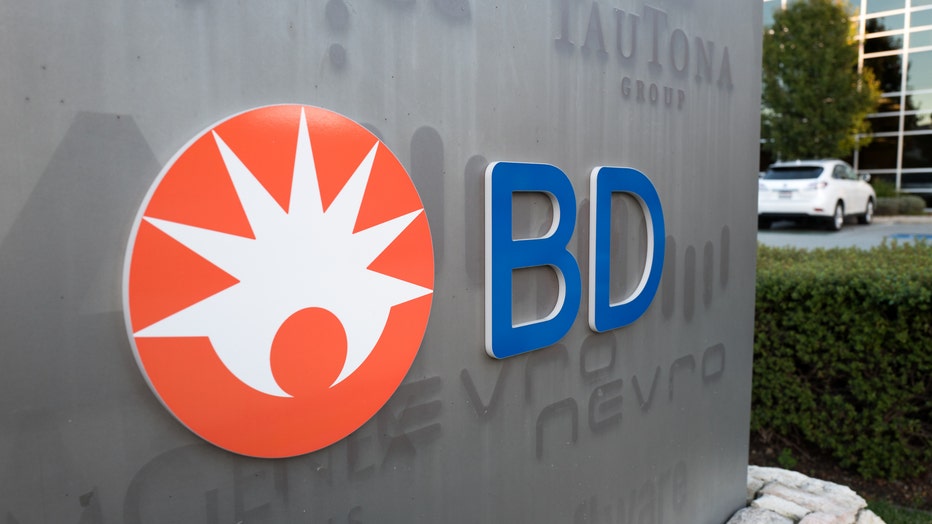FDA warns labs about high risk of false positives from medical company’s COVID-19 test
LOS ANGELES - The U.S. Food and Drug Administration issued a warning letter for clinical labs and health care providers over COVID-19 tests manufactured by global medical technology company Becton, Dickinson and Company (BD) which has produced coronavirus tests the department says are at high risk for false positive results.
In a study conducted by the company and cited by the FDA, approximately 3% of results from tests using the BD SARS-CoV-2 Reagents for the BD Max System were false positive results.
In its letter, the FDA wrote, “The BD SARS-CoV-2 Reagents for BD Max System test is only authorized for use in laboratories in the United States certified under the Clinical Laboratory Improvement Amendments of 1988 (CLIA) to perform moderate and high complexity tests."

FILE - Sign with logo at regional headquarters of medical technology company Becton Dickinson (BD) in Menlo Park, California, on Nov. 14, 2017.
The test received an Emergency Use Authorization from the FDA on April 8, 2020. The tests were promised by BD to offer COVID-19 results in two to three hours, according to a press release by the company.
"The new BD COVID-19 test for the BD MAX System will help increase availability of these much-needed tests around the world," said Dave Hickey, president of Integrated Diagnostics for BD, in April. "We continue to work towards a full portfolio of testing options to give health care workers choice and access to the right test for the right situation."
According to the FDA, the test is designed to detect viral nucleic acid from the virus that causes COVID-19 in upper respiratory specimens, such as nasal swabs.
The FDA is encouraging any and all health care providers to report suspected adverse experiences related to tests using the BD SARS-CoV-2 Reagents for the BD Max System and says it is “working with Becton, Dickinson and Company (BD) to resolve this issue.”
RELATED: Amid coronavirus spikes, COVID-19 testing demand is outpacing capacity, major test providers warn
The news comes as the demand for coronavirus testing in the U.S. is beginning to outpace the supply, according to a warning by major test providers.
On June 29, Quest Diagnostics, one of the nation’s leading medical testing companies, which completed more than 5 million COVID-19 diagnostic tests in June, announced that it was overwhelmed by the surging demand for coronavirus-related services.
As a result of the high demand, the company said it is currently only providing single-day turnaround for coronavirus test results for hospitalized patients only.
The company added that orders for its molecular diagnostic services have grown by 50 percent in the past three weeks.“We communicated that we are experiencing surging demand for our COVID-19 molecular diagnostic testing services. We also communicated that this demand is likely to extend average turnaround times for reporting test results,” the company said in a statement.
LabCorp, another major testing company which performs approximately 130,000 COVID-19 tests per day, said in a statement that a delay in testing results should be expected due to the recent surge in demand.
“In recent weeks, we have seen a steady increase in demand for molecular testing and we are doing everything we can to continue delivering results in a timely manner while continually increasing testing capacity,” the company said.
LabCorp said that results for COVID-19 tests on average may take one to two days longer.
Health officials have said that testing in the United States early on was insufficient for optimal containment of the virus. In early March, Dr. Anthony Fauci, a member of the White House coronavirus task force, testified that the nation's testing system was “not really geared to what we need right now” and added, “it is a failing. Let’s admit it.”
By mid-February, when some of the first CDC coronavirus tests were administered, technicians reported getting inconclusive results, which the CDC said could be due to the test looking for signs of generic coronaviruses, of which there are many, rather than the specific virus that causes COVID-19.
By then, only about a half-dozen state and local public health labs had reliable tests.
In March, President Donald Trump assured Americans that the COVID-19 test developed by the Centers for Disease Control and Prevention was “perfect” and that “anyone who wants a test can get a test.” But more than two months after the first U.S. case of the new disease was confirmed, many people still could not get tested.

